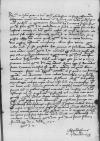Quamvis non habeam, quod praecipue nunc scriberem in exspectatione adventus domini Johann Tymmermann (Johann Zimmermann) (*1492 – †1564), nephew of Mauritius Ferber, Bishop of Ermland; studied in Cracow (1505) and in Rome (1517); 1519-1564 Canon of Ermland (Warmia); 1525-1528 administrator of the Chapter's estates in Allenstein (Olsztyn) and in 1538 in Frauenburg (Frombork); 1527-1539 Cantor of Ermland; 1537 General Administrator of the bishopric of Ermland (after Mauritius Ferber's death); 1539-1552 Custos of Ermland; 1547-1552 General Vicar of the diocese of Ermland (SBKW, p. 261; KOPICZKO 2, p. 336)⌊cantorisJohann Tymmermann (Johann Zimmermann) (*1492 – †1564), nephew of Mauritius Ferber, Bishop of Ermland; studied in Cracow (1505) and in Rome (1517); 1519-1564 Canon of Ermland (Warmia); 1525-1528 administrator of the Chapter's estates in Allenstein (Olsztyn) and in 1538 in Frauenburg (Frombork); 1527-1539 Cantor of Ermland; 1537 General Administrator of the bishopric of Ermland (after Mauritius Ferber's death); 1539-1552 Custos of Ermland; 1547-1552 General Vicar of the diocese of Ermland (SBKW, p. 261; KOPICZKO 2, p. 336)⌋ suspensus, qui de felici Reverendissimae Dominationis Vestrae valetudine et praesentia in Ermland (Warmia, Varmia), diocese and ecclesiastical principality in northeastern Poland, 1466-1772 within the Kingdom of Poland, Royal Prussia⌊episcopatuErmland (Warmia, Varmia), diocese and ecclesiastical principality in northeastern Poland, 1466-1772 within the Kingdom of Poland, Royal Prussia⌋ suo nobis referat, tamen, cum dominus Paweł Płotowski (*ca. 1485 – †1547), in 1523, after the death of Fabian von Lusian (Luzjański), Płotowski was one of the King's four candidates for the post of the bishop of Ermland; in 1530 and 1537, after the death of Jan Konopacki (Johann von Konopat) Sr and Dantiscus' transfer to the bishopric of Ermland, he made an effort to obtain the dignity of bishop of Kulm; from 1522 Provost of the Ermland (Warmia) Chapter, and from 1523 Canon of Ermland; secretary to Crown Grand Chancellor Krzysztof Szydłowiecki, and from 1533 royal secretary and courtier; in the thirties and forties several times royal envoy to the Royal Prussian Estates (SBKW, p. 191; KOPICZKO 2, p. 249-250)⌊praepositusPaweł Płotowski (*ca. 1485 – †1547), in 1523, after the death of Fabian von Lusian (Luzjański), Płotowski was one of the King's four candidates for the post of the bishop of Ermland; in 1530 and 1537, after the death of Jan Konopacki (Johann von Konopat) Sr and Dantiscus' transfer to the bishopric of Ermland, he made an effort to obtain the dignity of bishop of Kulm; from 1522 Provost of the Ermland (Warmia) Chapter, and from 1523 Canon of Ermland; secretary to Crown Grand Chancellor Krzysztof Szydłowiecki, and from 1533 royal secretary and courtier; in the thirties and forties several times royal envoy to the Royal Prussian Estates (SBKW, p. 191; KOPICZKO 2, p. 249-250)⌋ noster ob causam, ut opinor, citationis sibi nuper insinuatae Reverendissimam Dominationem Vestram adiret, non sum passus absque litteris meis, quibus Reverendissimam Dominationem Vestram in nova ditione, Deo auspice, constitutam inviserem, illum istuc venire.
Gratulor autem, si ista profectio laeto omine et salubriter cecidit, nam audivi Christine Schultze (Christine Scholcz) (†1539), mother of Ioannes Dantiscus (PSB 4 Dantyszek, s. 424)⌊matremChristine Schultze (Christine Scholcz) (†1539), mother of Ioannes Dantiscus (PSB 4 Dantyszek, s. 424)⌋ Reverendissimae Dominationis Vestrae nonnihil aegritudinis passam esse. Quae res ne quid perturbationis et aegrimoniae Reverendissimae Dominationi Vestrae ... illegible⌈...... illegible⌉ attulerit, subverebar. Nihil autem magis opto, quam ut ex animi sententia omnia Reverendissimae Dominationi Vestrae cedant.
Quam rogo, si Bernhard von Höfen (Bernhard Flachsbinder) (†after 1548), Ioannes Dantiscus' brother, stayed with Dantiscus in Spain, as a member of his mission's retinue, and was used as a trusted courier to Poland at least from 1526; after 1530 Starost of Löbau⌊BernardusBernhard von Höfen (Bernhard Flachsbinder) (†after 1548), Ioannes Dantiscus' brother, stayed with Dantiscus in Spain, as a member of his mission's retinue, and was used as a trusted courier to Poland at least from 1526; after 1530 Starost of Löbau⌋ frater Cracow (Kraków, Cracovia), city in southern Poland, Małopolska, on the Vistula river, from 1038 capital of the Kingdom of Poland⌊CracoviaCracow (Kraków, Cracovia), city in southern Poland, Małopolska, on the Vistula river, from 1038 capital of the Kingdom of Poland⌋ reversus est, quem in modum res nostras illic curaverit, facere me dignetur certiorem et, si quid a me fuerit agendum, me admoneat, immo iubeat decernatque de me, quodcumque collibuerit, cui mihi obtemperare est solemne.
Magnificus dominus Georg von Baysen (Jerzy Bażyński) (*1469 – †1546), 1503-1512 Chamberlain of Marienburg (Malbork); 1512-1546 Voivode of Marienburg (PSB 1, p. 377)⌊palatinus MarieburgensisGeorg von Baysen (Jerzy Bażyński) (*1469 – †1546), 1503-1512 Chamberlain of Marienburg (Malbork); 1512-1546 Voivode of Marienburg (PSB 1, p. 377)⌋ inclusas nuper ad me misit litteras. Cui me excusavi, quod non liceat mihi, etiamnum privato et in consilium terrarum non recepto, sumere hanc in publicis negotiis auctoritatem aut immiscere me Council of Royal Prussia the most important local authority in Royal Prussia. It consisted of two bishops (of Ermland (Warmia), who served as the Council’s president, and of Kulm (Chełmno)), three voivodes (of Kulm, Marienburg (Malbork), and Pomerania), three castellans (of Kulm, Elbing (Elbląg), and Gdańsk (Danzig)), three chamberlains (of Kulm, Marienburg, and Pomerania), and representatives of the three Great Prussian Cities – Gdańsk, Thorn (Toruń), and Elbing (ACHREMCZYK 2016, p. 17-18)⌊dominis consiliariisCouncil of Royal Prussia the most important local authority in Royal Prussia. It consisted of two bishops (of Ermland (Warmia), who served as the Council’s president, and of Kulm (Chełmno)), three voivodes (of Kulm, Marienburg (Malbork), and Pomerania), three castellans (of Kulm, Elbing (Elbląg), and Gdańsk (Danzig)), three chamberlains (of Kulm, Marienburg, and Pomerania), and representatives of the three Great Prussian Cities – Gdańsk, Thorn (Toruń), and Elbing (ACHREMCZYK 2016, p. 17-18)⌋, vel ad Sigismund I Jagiellon (Zygmunt I) (*1467 – †1548), King of Poland and Grand Duke of Lithuania (1506-1548); Duke of Głogów (Glogau) (1499-1506), Duke of Opava (1501-1506), Governor of Silesia (1504-1506); son of King Kazimierz IV Jagiellon and Elisabeth of Austria⌊regiam maiestatemSigismund I Jagiellon (Zygmunt I) (*1467 – †1548), King of Poland and Grand Duke of Lithuania (1506-1548); Duke of Głogów (Glogau) (1499-1506), Duke of Opava (1501-1506), Governor of Silesia (1504-1506); son of King Kazimierz IV Jagiellon and Elisabeth of Austria⌋ scribentibus, vel civitatum acta corrigentibus, nondum videlicet adepta administratione mihi destinata. Non possum quidem probare factum Citizens of Gdańsk ⌊GedanensiumCitizens of Gdańsk ⌋, quod insalutato probably Sigismund I Jagiellon (Zygmunt I) (*1467 – †1548), King of Poland and Grand Duke of Lithuania (1506-1548); Duke of Głogów (Glogau) (1499-1506), Duke of Opava (1501-1506), Governor of Silesia (1504-1506); son of King Kazimierz IV Jagiellon and Elisabeth of Austria⌊principeprobably Sigismund I Jagiellon (Zygmunt I) (*1467 – †1548), King of Poland and Grand Duke of Lithuania (1506-1548); Duke of Głogów (Glogau) (1499-1506), Duke of Opava (1501-1506), Governor of Silesia (1504-1506); son of King Kazimierz IV Jagiellon and Elisabeth of Austria⌋ ac dissuadentibus Council of Royal Prussia the most important local authority in Royal Prussia. It consisted of two bishops (of Ermland (Warmia), who served as the Council’s president, and of Kulm (Chełmno)), three voivodes (of Kulm, Marienburg (Malbork), and Pomerania), three castellans (of Kulm, Elbing (Elbląg), and Gdańsk (Danzig)), three chamberlains (of Kulm, Marienburg, and Pomerania), and representatives of the three Great Prussian Cities – Gdańsk, Thorn (Toruń), and Elbing (ACHREMCZYK 2016, p. 17-18)⌊dominis consiliariisCouncil of Royal Prussia the most important local authority in Royal Prussia. It consisted of two bishops (of Ermland (Warmia), who served as the Council’s president, and of Kulm (Chełmno)), three voivodes (of Kulm, Marienburg (Malbork), and Pomerania), three castellans (of Kulm, Elbing (Elbląg), and Gdańsk (Danzig)), three chamberlains (of Kulm, Marienburg, and Pomerania), and representatives of the three Great Prussian Cities – Gdańsk, Thorn (Toruń), and Elbing (ACHREMCZYK 2016, p. 17-18)⌋ instaurarunt iam positos malleos, verum quod nescio, an vicio eis verti possit, quod recudunt nummos illos Talenses, nempe monetam exoticam et olim prohibitam ac in id, ut apparet, paratam, ut operis quibusvis deserviant. Sed id committo me prudentior superinscribed⌈rr superinscribed⌉ibus, commendans me dilectioni Reverendissimae Dominationis Vestrae.
Quam Deus servet felicem.


 AAWO, AB, D.2, f. 76v
AAWO, AB, D.2, f. 76v